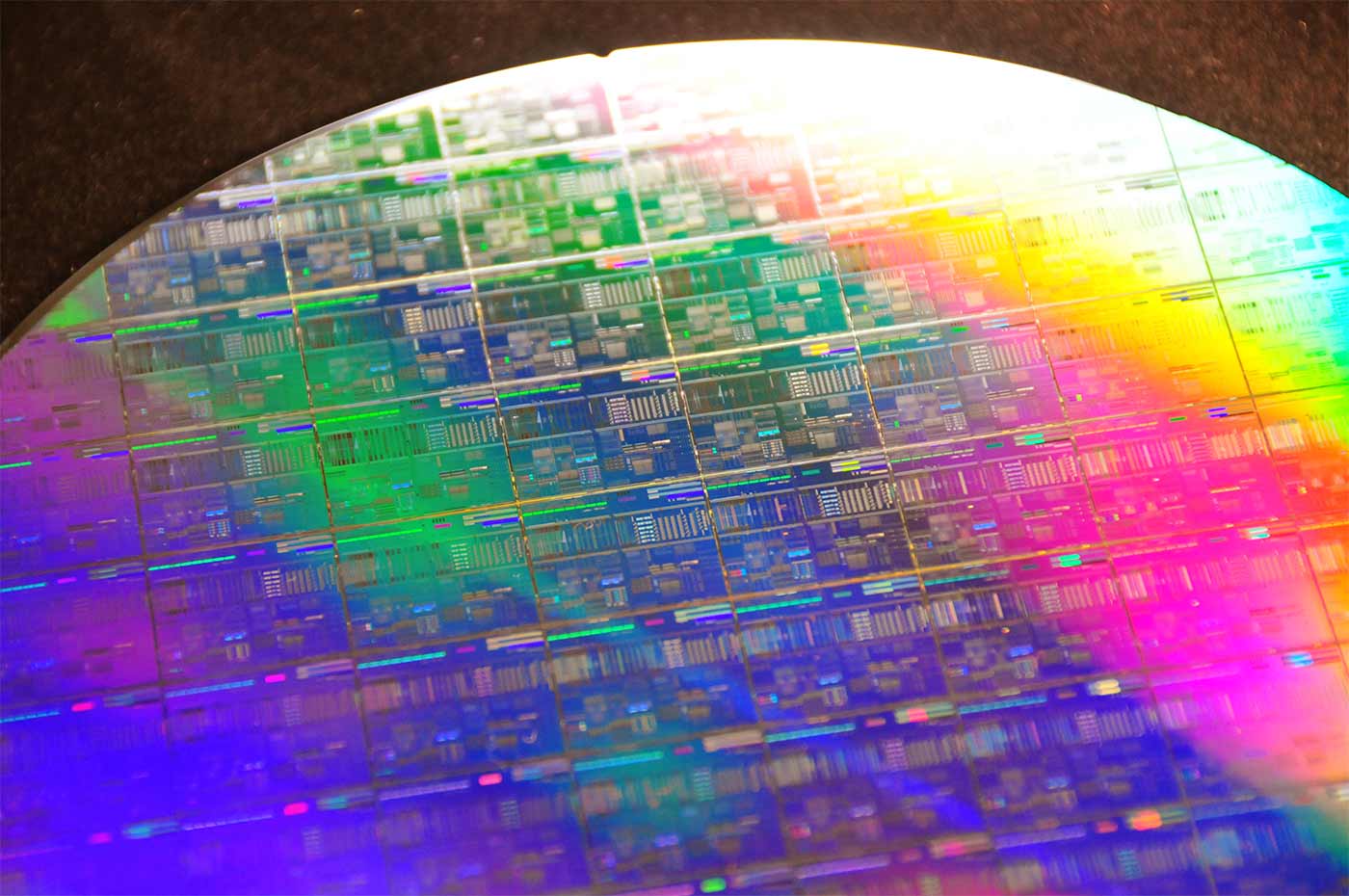
UC San Diego Engineering Team Involved in a New $600 Million Photonics Center
Published Date
By:
- Liezel Labios
Share This:
Article Content

Wafer-scale fabrication of photonic devices is enabled by silicon foundry manufacturing, lowering the cost per device and increasing the complexity and functionality of chip-scale opto-electronics systems. Photo by S. Mookerjea/UC San Diego.
A team of photonics researchers at the University of California, San Diego is part a new multimillion dollar photonics manufacturing and research center based in Rochester, New York. Vice President Joseph Biden and Governor Andrew Cuomo announced on July 27 the details of the American Institute for Manufacturing Integrated Photonics (AIM Photonics), which was established to push the United States as a worldwide leader in photonics manufacturing.
The photonics team at UC San Diego is led by electrical engineering professors Yeshaiahu Fainman and Shayan Mookherjea, along with UC San Diego Jacobs School of Engineering Dean Albert P. Pisano, a professor in the Department of Mechanical and Aerospace Engineering and the Department of Electrical and Computer Engineering.
The new integrated photonics center brings government, industry and academia together to advance state-of-the-art photonics technology and boost American manufacturing in the field of photonics. A major goal for the consortium will be to develop low-cost, high-volume manufacturing methods to interface advanced electronic integrated circuits with cutting-edge integrated photonic devices.
Photonics is a field of science that focuses on the generation, manipulation and detection of light, with applications in high-bandwidth communications, robotics, automotive technologies, medical imaging, lighting, next-generation displays, defense technologies and much more. Integrated photonics circuits incorporate multiple miniature optical structures fabricated on a microchip which control light in order to encode, transmit and decode information.
AIM Photonics is a national consortium of 124 companies, non-profit organizations, and universities led by SUNY Polytechnic Institute. Partnering universities include UC San Diego, UC Santa Barbara, UC Davis, UC Berkeley, Stanford University, California Institute of Technology, University of Arizona, Columbia University and Massachusetts Institute of Technology, among other institutions across the nation.

From left, Yeshaiahu Fainman, Shayan Mookherjea and Dean Albert P. Pisano.
AIM Photonics research team at UC San Diego
The UC San Diego team is led by faculty at the Jacobs School of Engineering:
- Electrical engineering professor Yeshaiahu Fainman is an expert in nanophotonics and ultrafast optics. His research has helped develop photonic technologies for optical circuit switching in data centers, quantum cryptography, imaging, optofluidics and biochemical sensing systems. Fainman is an IEEE Fellow and an OSA (The Optical Society) Fellow.
- Electrical engineering professor Shayan Mookherjea has developed silicon photonics for data center components, low-power optical mixers and single-photon devices. He is an OSA Fellow and leads the Micro/Nano-Photonics group at UC San Diego, which studies chip-scale linear, non-linear and quantum silicon photonic devices.
- Dean Albert P. Pisano of the Jacobs School is an expert in sensors and integrated micro-systems. His research is driven by a passion for developing, mastering and advancing technologies to solve problems. Pisano is also an IEEE Fellow and a member of the National Academy of Engineering (NAE).
Over the last several years, Fainman and Mookherjea have collaborated with large global industry partners such as Oracle, Google and IBM, as well as with small businesses that advance integrated photonics in the defense and healthcare sectors. They also have ongoing collaborations with national laboratories such as Sandia National Laboratories and SPAWAR, where silicon photonics is being actively developed.
Fainman, Mookherjea and Pisano have carried out pioneering work in integrated silicon photonics for more than two decades. Together, these faculty and their research groups will advance integrated photonics for future data communication systems. The UC San Diego researchers aim to develop integrated silicon photonics to lower the energy-per-bit costs of next-generation high-bandwidth networks. A goal is to build integrated photonics that are scalable and compatible with multiple platforms.
The team will also explore new integrated photonics that will lead to smaller, less expensive, ultra-sensitive biochemical and medical sensing devices. To meet the needs of future mobile biochemical and medical systems and services, sensing and diagnostic technologies need to be miniaturized. Current sensing technologies utilize bulky equipment, which limit their sensitivity and specificity. Existing systems are also expensive. To overcome these limitations, the UC San Diego team will create new chip-scale integrated photonic sensor systems that can be easily integrated with future mobile platforms. These photonic sensor systems will prevent the need for bulky equipment, reduce cost, and will be designed to enhance detection sensitivity and specificity.
UC San Diego is home to fabrication prototyping facilities and the Chip-scale Photonics Testing Facility, which provides accurate, high-speed testing capabilities that will be essential for developing and studying new integrated photonic systems. Research laboratories hosted in the Qualcomm Institute and Jacobs School of Engineering will also facilitate the team’s efforts.
AIM Photonics is one of the new manufacturing institutes proposed in President Obama’s National Network for Manufacturing Innovation. Total investment in the institute has already surpassed $600 million. The Department of Defense has committed to investing $110 million, and more than $500 million has been pledged by commercial and other partners involved in the consortium.
Share This:
You May Also Like
Stay in the Know
Keep up with all the latest from UC San Diego. Subscribe to the newsletter today.


